Travis Harvego & Matthew McDaniel - Don't Miss the Roofing Revolution - PODCAST TRANSCRIPT
May 8, 2025 at 12:00 p.m.Editor's note: The following is the transcript of a live interview with Travis Harvego and Matthew McDaniel from Roofle. You can read the interview below or listen to the podcast.
Intro: Welcome to Roofing Road Trips, the podcast that takes you on a thrilling journey across the world of roofing. From fascinating interviews with roofing experts, to on-the-road adventures, we'll uncover the stories, innovations and challenges that shape the rooftops over our heads. So fasten your seatbelts and join us as we embark on this exciting roofing road trip.
Heidi Ellsworth: Hello and welcome to another Roofing Road Trips from RoofersCoffeeShop. My name is Heidi Ellsworth and today on this Roofing Road Trips podcast, I'm really excited to talk about e-commerce in roofing. Yes, I said that, e-commerce in roofing. Is there going to be a day when we're going to sell roofs off on websites? It's all going to be handled digitally? Well, guess what? That's already happening and we wanted to talk to the experts who really have revolutionized the industry and brought this to us. And that is our friends, Travis Harvego and Matthew McDaniel with ROOFLE. Hello, gentlemen.
Travis Harvego: Hey, thanks for having us on, Heidi. Pleasure to be here and speaking about ROOFLE and the effects that we've had in the industry. So, thank you so much.
Heidi Ellsworth: You guys are game changers.
Matthew McDaniel: Thanks so much, Heidi. It's a pleasure to be here.
Heidi Ellsworth: It's so good. Let's start with some introductions. Matthew, why don't we start with you, if you can introduce yourself and tell us what you do at ROOFLE?
Matthew McDaniel: Yeah, sure. One of the Founders at ROOFLE. I am the Chief of Product and Marketing, so it's a nice blend of both development side, as well as the digital side, so.
Heidi Ellsworth: Fun, all the new stuff. Yeah, I love it. And Travis, can you introduce yourself, tell us what you do with ROOFLE and then maybe give us a little bit of the history of ROOFLE?
Travis Harvego: Yeah, yeah, sure. So yeah, I'm Travis, CEO and Co-Founder of ROOFLE. And so, where we got our start is, all the founders come from a background of a construction company. So this is all technology built for contractors by contractors and so that's really where it came out of. So we really kind of thought of the idea because we'd been in construction for 12 plus years doing residential remodeling and we saw really kind of this opportunity and this shift to this change really happening as the consumers are changing. And so we're like, hey, what hasn't evolved quite yet in the roofing industry when we're thinking about all the different things that evolved? And really, that in-person sale part of it hadn't really evolved yet. So we were thinking about ways of, how can we present a price while they're on our website? How can we present them with products? How can we present them with the ability to be able to use a visualizer and those types of things to where they can pick out a product, actually see that on their home?
Travis Harvego: So then all of a sudden we launched ROOFLE.com. And so when ROOFLE.com launched, it was a full B2C company. So we were selling direct to consumer, so we were using nothing but technology giving all these things I just talked about to homeowners where they would come to our website, browse from our catalog, browse some products, get instant prices and then they could request their final proposal that they could actually sign as well. So we did that for about two and a half years, did a bunch of testing on what homeowners liked, what they didn't like, what really drove them to different decisions. And then we eventually switched our business model to where we are today, which is now a B2B software company, to where now we offer our software to contractors that's a fully white labeled solution that looks like it's actually their software, that then goes on their website to allow for this e-commerce type experience right there on their website.
Heidi Ellsworth: That is so cool. Okay, I want to back up just a little bit, because a couple years ago, Travis, I heard you speak at the Washington Roofing Contractors Association and you were kind of talking about the history of e-commerce and roofing. And really, how people didn't believe this was ever going to happen. Can you give us just, I would love your quick overview of where we've come on e-commerce and even more than that, where we've come in the last two years since I heard you speak about it one of the first times.
Travis Harvego: Yeah, so I mean, you've heard me speak and for those others, I've been to probably hundreds of other speaking events since then. Really, just educating on e-commerce or educating on really just the change and the evolution of this industry.
Travis Harvego: And one thing when it comes to contractors, you have to get it into terms to where they understand it. Just meaning, they always want to say, "It can't happen, it'll never happen. There's no way. This is an in-person type sale," until you start getting their brains turning. So then I usually go through the evolution of the industry and say, "Look, we used to hand measure, now we rely on digital satellite. We used to use paper files, now we use CRM," and all these different changes, right? Drones and all these different changes that have came into our industry. And then their wheels start turning, especially when I talk about the whole during COVID, people doing virtual selling, to where they were using Zoom or things like that during virtual selling. They're like, "Oh my god, I did do that." So then I'm like, well, here we go, in-person sale, e-commerce, right? And they're like, "Okay, I'm listening, now you have my attention." Early on they would say, "I don't even want to hear it," but now they start to listen when you start to talk about those things.
Travis Harvego: So we released our platform really strategically in the way that in order to get really mass adoption as we release the first part, which is obviously around lead conversion or conversion on the websites, give the homeowner really what they want, which is really, what is this going to cost me? That's really what homeowners care about when they come to initially shop for a roof. Right? So draw them in by giving them that caption that says, "What's it going to cost?" And then once they see what it's going to cost, now start showing them the products. Right? So now they're looking at a catalog that says I have options of upgrades, I have all these options of colors. So now they're really shopping and starting to look at what they like. And then they can use a visualizer to where now they can say, okay, here's my home, here's a photo of my home. Let's put this product, let's put this color on there. Okay, yes, this looks good. And then from there, they can actually request their final proposal.
Travis Harvego: So where have we came? Well, two years is kind of a long way for me to think about way back then. Way back then, it just seems like an eternity to me over the last two years. But some of the bigger groundbreaking things was before was, we didn't have the capabilities of actually producing this e-signable proposal for the homeowners. So before we didn't have that, now we do. So now we have the capability. So when the homeowner says, "Like what I see here, liking this cost, liking this product, liking how it looks at my house. Now can you give me something that's actually a signable proposal that we can actually move forward with?" Now that can be generated in our platform that can then be sent off to the homeowner to where now you have something that's being sent to the homeowner.
Travis Harvego: Also inside the platform, which is fairly new, is also the ability to have weather reports in there as well. So weather reports is new. This is the first time to where in our space, being in the roofing space specifically, to where the homeowner can not only figure out what the roof is going to cost instantly, but also understand or find out if they have a potential claim potentially right on their hands or if they've had some sort of storm reports. So now for contractors that are like, "Well, I'm retail, I'm insurance. How do I price this? How do I know?" Well, now you know, because we're able to identify now whether this property is actually in a storm affected area. So now whether this is going to be an insurance route project or whether you know this is actually going to continue on down this retail path, which then you're going to be able to present this proposal to them to where now you're actually signing a contract to where you're not ever physically inside of the home whatsoever.
Heidi Ellsworth: That is so cool. I love it. Wow. New stuff. I mean, so okay, just those examples that you just gave. Matthew, you're in charge of product, product development, marketing. How do you watch the trends out there in the digital space and really stay in front of it to make sure that know ROOFLE is right in front with all the new stuff of this, what I call the Amazon age?
Matthew McDaniel: Yeah and there certainly is so much influence out there and knowledge always comes from the outside. And what's interesting is trying to combine all this technical knowledge from the outside where you have enterprise style applications that are building broad SaaS applications that are reaching millions and millions of people. And if you can kind of get inspired by their UI or their user interface, if you can get inspired by exactly what the user is experiencing while they're going through whatever process it is, whether it's purchasing online, whether that is getting through a service, surveying. Whatever the service is online, there are specific user interface flows that have been designed by some of the biggest companies in the world. And so paying attention to how those flows actually work to get the customer to go from point A to point Z.
Matthew McDaniel: The traditional model was always this funnel system, where you're just simply trying to funnel down a customer. And that really has dramatically changed into sort of more of a circular model, where it's more of an influence map where you're constantly engaging with the customer. And that's very true in the roofing space as well, is people don't always know exactly when that project is going to be and the toughest thing is to nail that person at the right time.
Matthew McDaniel: But with ROOFLE, what you can do is you can get them not just at the right time, but 24/7 at the right time, they can actually get the answer that they're looking for. Whereas before, they would have to stew and then now you're competing with their attention and you're not just competing with their attention across other contractors in the space, people's attention is being, it's competing against all of the influencers in the entire social space, all of the constant competition for your attention span, whether that's your family, whether that's work, whether that's social media, whether that's all these things swirling. So you're fighting for people's attention and you have a very short time to get them what they need and if you're not able to produce that, they're going to move on very quickly.
Matthew McDaniel: And so, we're trying to accommodate the modern consumer in that they don't have much time and they are only able to act in times of their own convenience. And that's really what we've kind of designed this platform around, is taking the outside influence of these mega companies that have spent a lot of time, effort, money and have a lot of very talented people to design these experiences, but also make it in a way that's simple enough for a contractor to absorb and to enact and to implement into their own process. And just kind of simplify it on both ends of the spectrum.
Heidi Ellsworth: You just hit home with me, because I'm busy and if I want to do something, sometimes I want to do it at night, sometimes I want to do it at 4:00 in the morning. Sometimes I want to do it on the weekends. I'm trying to get in touch with people and I'm always like, okay, I got to wait until business hours.. And then, well, I'm in meetings all day long, I don't have time to do that during the day. So I really see this and I've seen it for a while. I've been a huge proponent of this because I just believe we've got to change how we do things going with this, whether it's the millennials or the millennials who taught their Gen X parents how to do, how to be and now with Gen Z, that's all, this is how they want to buy.
Heidi Ellsworth: So I'm going to take it back to you, Travis, on really for you to talk directly right now to the roofing contractors out there on why they should be moving to doing business digitally. Even though like you said, they're like, "It'll never happen, it's not going to happen," but it is. So, talk to them about that.
Travis Harvego: Yeah, yeah, it really is. And so just to back up a couple of things that Matthew talked about, you just discussed and just even back up more about doing things digitally, is that the millennials own over one third of the homes today. Shocking, right? But the millennials are getting older and so they're in their 40s now, they're the ones that are owning homes and even the next generation that's coming up is starting to own homes even as well. And so we had to think about that mindset as far as how myself, when I grew up, I mean, I had computers in my school. I know since I was in second, third grade, we were using computers. So we have been really trained to go that digital way.
Travis Harvego: So knowing that that's what we prefer as a digital way is that we learned a few things when we were selling direct to consumers was that number one, consumers were available or 70% of our business was done between 8:00 and midnight and the reason why is because that's when the consumers were actually available, when they actually could go ahead and browse. Similar to was like 75% of our business was done through finance, because we made it convenient for them to finance. So in our platform, we allow for a finance option to where now you presented a price, now you can get financed. And then society is now even pushing more people towards learning to finance.
Travis Harvego: I just saw the other day, you can now finance your DoorDash delivery. We're financing 25, $30 dollar orders. In my college days, I would've loved that, that would've been amazing. But now we're paying payments on our digital orders. So now everything is just becoming to now being more normal for this next generation to just finance or pay payments on everything, shift shifting that way. So the importance of being able to move everything digitally for contractors is number one is obviously the generation that that's coming up and owning homes. It's a very digital age. That's how they're going to be searching, that's how they're going to be shopping. Contractors are not open between eight and midnight, so how are they going to be able to find you and search you and all of those things? It's going to be digitally probably on their phone.
Travis Harvego: And then also, contractors have to think about private equities in our space. Right? So all these big giants in private equity, it's a big topic right now in our space. So all these companies are rolling up together, becoming these big monster companies. How are you going to compete against them? How are you going to survive, compete against? Well, a lot of contractors that we talk to are starting to expand their service areas by using our technology. So instead of only going out 40 or 50 miles from their office, now they're going out maybe 80, 100 miles from their office, so they're expanding their footprint because they're able to go after these homeowners digitally, to where it makes more sense for them to be able to expand their market reach to where now that they can take advantage of this type of technology and be able to generate more revenue within their business.
Travis Harvego: And not to mention, digitally also saves them as well for potential for higher gross margins by using more digital automations and everything they use digital without actually using human or different things like that. They can also save money that way as well. So all around the way you look at your business, everything is shifting more towards contractors needing to take a hard look within their business and looking at moving more things digitally within their business.
Matthew McDaniel: Yeah and I just want to add something to that if can. Yeah, so in the digital space and specifically in the kind of this e-commerce space, there's different types of models. You have your Amazon model that is a centralized marketplace style. That's essentially kind of what we initially had set up for testing and to make sure the market was ready for selling roofs online and just to really do a lot of iterations to figure out what is the perfect path? What is the drop-off points and so forth?
Matthew McDaniel: There's another model which is more of a Shopify style model. Now this is where you can actually embed a shop or an e-commerce store directly on your own real estate, your own website. And it gives total power to the small business owner, whereas the Amazon style model is very centralized, you're giving all the sort of power toward the central entity. Now it still creates an ecosystem in that model and that still serves a purpose and you're still able to bridge the gap between party A and party B, the contractor, the homeowner and so forth, installers. But this other model that we are enacting, which is to liberate the small business owner, to make the playing field a lot more level with these bigger entities, is to actually giving them the power in their own hands, in their own space, which is their website.
Matthew McDaniel: With your website you could do so much with. You can promote on social and have somewhere to send them to. You can even in traditional marketing, you can have yard signs, door hangers with QR codes. The point is, is that you have a place to send people to that is your real estate, it is your digital storefront and they have an equal experience that some of these bigger companies are offering. So, it really makes the small guys look way more professional and it levels the playing field and it also locks in the legacy of all these hard-earned, hard built brands that are multi-generational family brands that we want to celebrate and we want to keep intact across this country, if we're going to keep pressing forward and make this country better and better, we have to stick and we have to celebrate and we have to honor our contractors and their small businesses. And we feel like we're doing that with this style model, which is more of the Shopify style model.
Heidi Ellsworth: Okay, what you just said totally rings the bell for me because... Okay, I'm going to go a little off here, but when we talk about solar, the question is always, who's going to own the roof, right? Mr. Roofing or Mrs. Roofing contractor, are you owning the roof or are you going to let somebody else own the roof? It's really the same thing that you're saying, Matthew and it's so powerful is, who are we going to let, who is this industry going to have own the roof? Are you going to sell it digitally like people want to buy it or are you going to let somebody else sell it digitally and take that control out of your hands? I think that's brilliant and so true.
Matthew McDaniel: And that's why we're moving so fast and hard to get adoption and to grow fast, because we want this to become the new standardized way where contractors have taken the power, taken the control out of that centralized approach that they've worded it off before it can become a reality.
Heidi Ellsworth: Yeah. There's a lot of training out there on how to sit at the kitchen table and sell and it has its place, I'm not going to say it doesn't. There's definitely a lot of people who still want to have that kitchen table experience, they want that face-to-face experience. But as we look going forward to really selling online and maybe Travis, you can take this, what are some of the things contractors need to be thinking about in changing their selling process or maybe even a hybrid selling process to really think about how they're interacting with their customers on where they want to interact?
Travis Harvego: Yeah, I think it really comes down to giving the consumer really what they want. If they want the traditional model, offer it to them, right? Even if they don't want to see their instant price, they want a traditional way or if they want to see the price instantly but then still want to set an in-person appointment, allow them. Give them that flexibility. We talk a lot about embedding certain links within your website or within our technology to allow that homeowner to book that in-person appointment. At any point throughout the experience they can book that in-person appointment if they choose so, because you're giving them that flexibility.
Travis Harvego: But if they want to do it remotely, allow that flexibility as well, because the benefit of being able to do things remotely is that a lot of our contractors from what we hear, have established virtual selling sales teams. I know dozens and dozens of companies that have done this, to where they're selling everything remotely. So they have sales reps in their home running appointments over Zoom and they're having those appointments and the homeowner will walk around with their cell phone if something needs to be identified, such as a leak area or whatever it is. The homeowner will show them around where they're not actually physically there, but getting all the information they would possibly need as if they were on site, because the homeowner wants that flexibility.
Travis Harvego: Also on top of that, sales reps for a company, they're paying those sales reps a little less than your traditional sales reps because they're not actually driving to the home, right? They're not driving their personal truck or company truck to the home, actually going there and doing that. So you can run six, seven appointments a day virtually, compared to most guys maybe running two a day, as far as if they're actually going to be in person. So it's much, much more efficient by being able to offer that option and I think a lot of contractors have been surprised by the number of homeowners that have actually flipped to more of that virtual option over the in-person option that they used to have today. And again, a lot of contractors come back to it, obviously it's all about the dollars. Right? It comes down to the bottom of the balance sheet, looking at it and saying, "Hey, we've been able to be more efficient, we've spent less money on gas, been able to run more appointments, being able to sell more jobs with all those extra opportunities we've been able to get to."
Travis Harvego: And also, the biggest thing for us too is weeding out those tire kickers, right? If a homeowner sees the price is $20,000 and they thought it was five, now they don't have to waste their time in two hours in the home because they already understand it's going to be 20 and it's not going to be five and you're not even in the same ballpark, as far as anything you're going to be able to work with as well. So it's really, really about efficiency to be able to get these contractors to be more efficient so they can put more profit in their pocket.
Heidi Ellsworth: Yeah, it's so true. And as you really look at what the homeowners are expecting and how they want to do it, it's changing the way contractors do business.
Heidi Ellsworth: Matthew, one of the questions I have is, there's a lot of traditional tasks that are, like we said, go drive out, get to the kitchen table, do all these kinds of things. What are some of those traditional tasks in the roofing sales process that are now digital with ROOFLE? Can you kind of go through some of those features and benefits for the contractors out there to see how they're going to be able to make this shift?
Matthew McDaniel: Yeah, no, it definitely starts with the lead process and the homeowner engagement. We allow the homeowner to sort of drive their own sale. So right away, they are putting in their address, they're clicking one more button and they're seeing their actual instant online estimate. From there, they can do more of a educational part of the process, so they're actually clicking around different products, they're understanding the installation packages, what's included, what's not, what might be additional costs, what the components are, different colors and such, different styles, materials. So now we're working on the educational piece. Again, this is all digital and this is all driven by the homeowner themselves. And then finally, they're getting to either financing or a digital proposal, which they can e-sign.
Matthew McDaniel: So traditionally, you would have to come out, meet with the homeowner. Now again, as Travis mentioned, this is certainly open to a hybrid approach, so at any point in time they could tap out and say, "Okay, I need an expert. This is too overwhelming. We'll have someone come out," or, "Hey, I just need to jump on the phone, answer a few questions, get me to that next step to where I'm comfortable again." But the fact that you're giving them that convenience and that immediate information, it's going to build trust with the homeowner. So that's another thing that's been digital, believe it or not, that sounds very ambiguous, but the trust building process. Before, you had to spend a lot of legwork building face-to-face trust with the homeowner. Obviously you have online reviews and so forth, but just being transparent up front and convenient, it builds trust with the homeowner digitally.
Matthew McDaniel: And then we're showing storm history reports to the homeowner, so that's just another part of the process that would probably have to be done either manually or connected through a rep. And then once they do request a proposal, there's two ways that you can order a detailed measurement. You can automate that detailed measurement from the homeowner's click, so it just speeds up the process either in EagleView, GAF QuickMeasure or our newest measurement provider, GeoSpan. It's actually coming out here a couple of days, plug there, thank you. And from there, they're able to verify that instant quote and add any additional costs. They can see now that there's a chimney and a skylight, they need an extra flashing. They could see that it's... So it's just more of a verification step. And then creating that proposal just takes just a few seconds, it's very turnkey.
Matthew McDaniel: And at that point, they can send it over through an email, they can text it. There's a link that they can send, the homeowner just jumps on, signs it digitally and now you have an actual digital contract that serves as the actual job contract. And actually from there, you could even turn that into a material order, so we do have digital material order. So the whole process can be done digitally from the very first engagement with the homeowner, to signing the contract, to financing, getting funding for the homeowner. It can be done through their smartphone in just a few minutes, they can secure up to 55K, even up to 75K with a further request. And then they have a five-month spending window on that, which is really nice. They can pretty much and that's exclusive with the contractor. They can't go out and shop that.
Matthew McDaniel: So we just honestly try to digitize the entire sales process. Now, digitizing doesn't mean dehumanizing. We make sure that there is this two-way street between the homeowner and the contractor that's still happening. There still is this chance for communication. Now, some of the communication is done automatically with the confirmation email and with some of the comms and then the other communication is done at the leisure of the contractor. So, whatever system they want to set in place, whether that's through an automation that continues to drive that automated communication, whether that's a sales agent or something crazy they want to go for these days, they put a live real salesperson in front of them or even a support person to answer their initial questions. It's all about, as Travis mentioned, adjusting to the demands and the desires of your consumer, of your potential buyer and just being as flexible as possible and having that expertise at every step of the way and just being convenient.
Heidi Ellsworth: Yeah and you can build on this. You may start where you're doing more traditional, less digital, but then as you get comfortable, those contractors can start adding more digital features and kind of grow that side of their business, right?
Matthew McDaniel: Yeah, absolutely. Most people start with just the lead gen, because that seems to be a very difficult pain point for contractors, is getting more leads and just having that consistent flow of opportunities. So having this conversion driver on their website is kind of the first point, but we've developed all these tools to really, really help contractors save time, look more professional, build trust and to be able to train their reps a lot easier and a lot more consistently.
Matthew McDaniel: That's one of the biggest pain points contractors have, is sales reps don't like to learn new systems or train on certain things, they like to do things their way. So you usually have the 80/20 rule, where you have 20% of your reps that are putting up 80% of the business and they're just rock stars. And if you could level up those other 80% and we're handing you a system that's basically plug and play, the admin contractor, the sales manager is setting up all the price and the products. So it's a very consistent experience for every single rep that comes in front of a homeowner and it's just making it way more easy for them to focus on the education and that relationship piece. Then all the operation, the admin side where there's scrambling, so I can't even talk about it because so confusing. It's all building the quotes out that takes hours and all the stuff. It's cumbersome and it takes away from the relationship of the salesperson and the homeowner.
Heidi Ellsworth: And everything, putting it together. Travis, you are all over, so are you, Matthew. You guys are seeing everyone. Travis, can you give us a couple examples? I mean, I've been hearing rumors of contractors that are fully digital. They don't even have outside sales reps anymore, but I know there's a lot in between. Can you give some examples of success, successful contractors who have really adopted ROOFLE and started down this path?
Travis Harvego: Yeah, I mean, we have a lot of stories. You can go to our website and check out a lot of our testimonials that we've shot, that they're just contractors at different events and shows that have shared their stories and how really adopting this technology has really changed their business and their mindset. And a lot of them have actually centered their websites, rebuilt their whole website centered really around our technology, which is absolutely incredible to be able to see that they believe in it that much.
Travis Harvego: But a couple of different things that contractors have said is like a 7,000% ROI, return on investment, 7,000%. Well, because you think about it is this way, is that our technology costs one price, right? Matter how much you use it, how many users, it's one cost. It's not like you're paying more per how much business you're getting, right? It's one flat cost. So every single job that you sell increases obviously that ROI that that we have there.
Travis Harvego: So one of our contractors has made over $500,000 just from revenue from Nextdoor organic engagement. So the Nextdoor app, he put our technology into his Nextdoor app and really what that app is all about, if you're not familiar, is really neighbors asking for referrals or asking for people who to go to. He puts his little link in there about get your instant code in there and it's been able to drive a ton of revenue to his business by allowing people just to go in there and be able to see what their pricing is and being able to get that trust through that transparency. Being able to weed out the tire kickers now has a couple few companies at over an 80% close rate. So again, they go into the home, they already know the price. So when they go in there, what's really their objection? Most times when there's objection to a contractor, it's typically about price, right? So when they've already seen a price that's out of the way, so increasing their close rates dramatically.
Travis Harvego: And then also, automating really real estate referrals. Everybody hates the realtor, right? He always wants quotes, he needs some now, needs some quickly, need some fast, but you're never going to get that business. You might get one out of 100, right? So contractors have been able to automate the process of sending realtors to this technology so that now they're using this technology on their own, they're able to generate everything that they need, without actually physically spending hours or days on all these quotes. They're able just to go there, get everything that they need and now all they're getting from the referral realtors is just sold deals is all they're getting now. So those are just some ways, there's so many more, but those are some ways that we've seen contractors be able to use this technology and improve their business today.
Travis Harvego: So, they could go to our website, ROOFLE.com, Matthew's built out some amazing tools for the contractors to be able to use, they can even try the technology for themselves right there on our website, even enter in their own address, go there and be able to check it out to see how the technology works. But really, they go to our website, see all that information there. They can also book a demo with one of our staff and they can walk them through. It's usually about a 30-minute process to be able to walk them through the entire thing to show them all the features we talked about today. We can usually get it done in about 30 minutes, to be able to show all those features to the contractors. We make it as easy as possible, as simple as possible.
Travis Harvego: And again, like I said, coming from the contracting background, I understand contractors. I know what most of their pain points are, so the system is really set up to be able to help contractors through it, understand it, get it and see where they can actually continue to see the ROI with their business. So ROOFLE.com is the only place you really need to go to check it out and they can be able to try it for themselves.
Heidi Ellsworth: I love it. Matthew, last thoughts, anything new that you want to mention or anything? Any last thoughts?
Matthew McDaniel: Yeah, we just have a lot of exciting things in the pipeline, but I just want to encourage everyone to really focus on the things that they can control these days. And there's all this hype about AI and all these things swirling out there in the world. Now the models are changing so rapidly that I don't want people to get distracted, I want you to really stay focused on your business and the things that you control. And we've tried to make it as easy as possible to implement new technology into your business. Now it is AI enhance, of course, we are using that technology to enhance the quotes, to enhance the financing, a lot of the experience, but just really focus on easy implementation, easy training and those little small ones every day are going to help tip you into that next scale of your business.
Heidi Ellsworth: I love it. Gentlemen, thank you so much. Always inspirational whenever I get to talk to you, I want to encourage everyone to go to the ROOFLE directory on RoofersCoffeeShop, you can find all the information there. Plus, obviously ROOFLE.com. This is something that when we started this podcast, I think Matthew said so well, is that if you're not selling it this way, somebody else is going to be. So, this is the time, take your time, find your path and your journey from a little bit of a hybrid to who knows, someday selling everything online. You just never know.
Heidi Ellsworth: Again, Travis, Matthew, thank you so much for being here today.
Travis Harvego: Thanks, Heidi.
Matthew McDaniel: Yeah, thanks so much, Heidi.
Heidi Ellsworth: Thank you and thank you everyone for listening. Again, please check out the ROOFLE directory on the RoofersCoffeeShop and then also be sure to check out all of our podcasts under our read, listen and watch. Be sure to set your notifications and subscribe on your favorite podcast channel so you don't miss a single episode. We'll be seeing you next time on Roofing Road Trips.
Outro: If you've enjoyed the ride, don't forget to hit that subscribe button and join us on every roofing adventure. Make sure to visit RoofersCoffeeshop.com to learn more. Thanks for tuning in and we'll catch you on the next Roofing Road Trip.




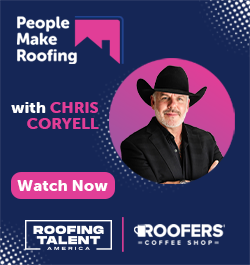









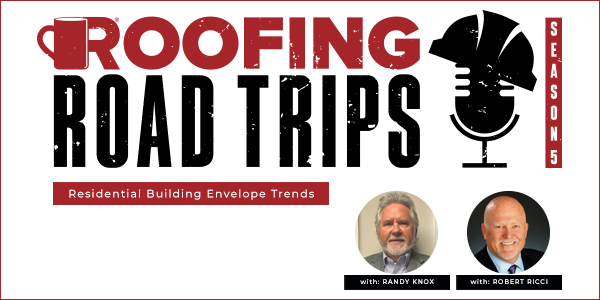
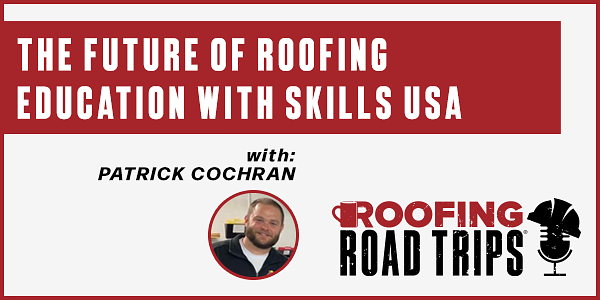
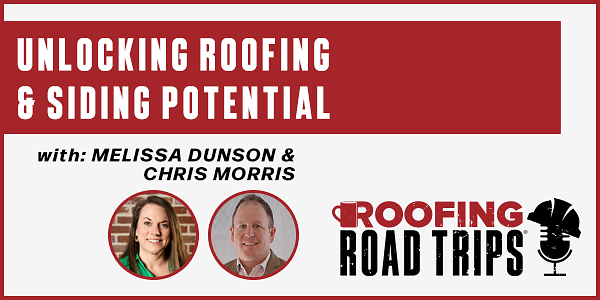



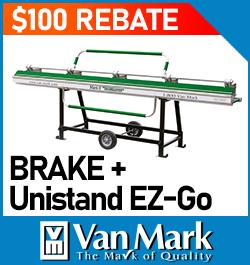



Comments
Leave a Reply
Have an account? Login to leave a comment!
Sign In